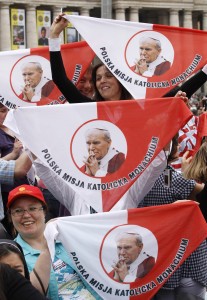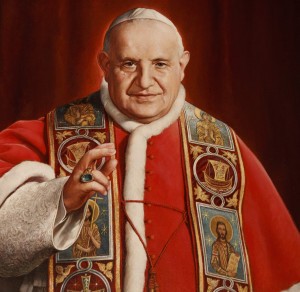
Pilgrims in St. Peter’s Square hold up handkerchiefs featuring Blessed John Paul II the day after his beatification in 2011. The late Polish pontiff will be declared a saint, the Vatican said July 5, after officials approved a second miracle attributed to his intercession.
Catholic News Service photo/Paul Haring
After Pope Francis met July 5 with Cardinal Angelo Amato, prefect of the Congregation for Saints’ Causes, the Vatican published a list of decrees the pope approved related to Blessed John Paul’s canonization and 11 other sainthood causes.
Publishing the decrees, the Vatican also said, “The supreme pontiff approved the favorable votes of the ordinary session of the cardinal- and bishop-fathers regarding the canonization of Blessed John XXIII (Angelo Giuseppe Roncalli) and has decided to convoke a consistory that will also involve the canonization of Blessed John Paul II.”
Normally, after a pope signs a decree recognizing the miracle needed for a canonization, the pope consults with cardinals around the world and calls a consistory — a gathering attended by any cardinal who wants and is able to attend — where those present voice their support for the pope’s decision to proclaim a new saint.
A date for a canonization ceremony is announced formally only during or immediately after the consistory.
The canonizations would have a direct effect on two Diocese of Knoxville churches, Blessed John XXIII Parish on the University of Tennessee campus and Blessed John Paul II Catholic Mission in Rutledge. Those communities would be celebrating name updates once the canonizations occur, replacing “Blessed” with “Saint.”

A painting of Blessed John XXIII, the pope who convened the Second Vatican Council, is seen in the museum dedicated to him in his birthplace of Sotto il Monte Giovanni XXIII, Italy. Pope Francis has ask the world’s cardinals to vote on the canonization of Blessed John XXIII, even in the absence of a miracle. The announcement came July 5 with Pope Francis’ decree that cleared the way for the canonization of Blessed John Paul II, the late Polish pontiff. Catholic News Service file photo/Paul Haring
The congregation members, according to news reports, also looked at the cause of Blessed John and voted to ask Pope Francis to canonize him without requiring a miracle. According to church rules — established by the pope and subject to changes by him — a miracle is needed after beatification to make a candidate eligible for canonization.
Jesuit Father Paolo Molinari, the longtime head of the College of Postulators — or promoters of sainthood causes — has explained that in the sainthood process, miracles are “the confirmation by God of a judgment made by human beings” that the candidate really is in heaven.
But, Father Molinari also has said that for decades theologians have explored the possibility that such a confirmation could come by means other than someone experiencing a physical healing. For instance, Blessed John Paul beatified Victoire Rasoamanarivo in Madagascar in 1989 after accepting as a miracle the case of a wind-swept brush fire stopping at the edge of a village whose inhabitants invoked her intercession.
Announcing the decision about Blessed John’s cause, Jesuit Father Federico Lombardi, Vatican spokesman, said the discussions about the need for miracles and what can be defined as an acceptable miracle continue. However, he said, the movement in the late pope’s cause does not indicate a general change in church policy.
The members of the Congregation for Saints’ Causes “have expressed their hope, and the Holy Father has accepted it,” Father Lombardi said. If Pope Francis “had any doubts, we wouldn’t be here” announcing the consistory to approve Blessed John’s canonization.
“As we all know very well, John XXIII is a person beloved in the church. We are in the 50th anniversary year of the opening of the Second Vatican Council, which he convoked. And I think none of us has any doubts about John XXIII’s virtues,” the spokesman said. “So, the Holy Father is looking toward his canonization.”
Father Lombardi also noted that no date for a canonization ceremony was announced, but it is likely that the two popes will be canonized together, possibly “by the end of the year.”
The other decrees approved by Pope Francis July 5 recognized:
* The miracle needed for beatification of Spanish Bishop Alvaro del Portillo, who in 1975 succeeded St. Jose Maria Escriva as head of Opus Dei. Bishop del Portillo died in 1994.
* The miracle needed for the beatification of Maria Josefa Alhama Valera, also known as Mother Esperanza, the Spanish founder of the Handmaids of Merciful Love and the Sons of Merciful Love. She died in Italy in 1983.
* The martyrdom of four groups of priests and nuns killed during the Spanish Civil War in 1936-1939.
* The heroic virtues of three founders of religious orders; an Italian priest; and an Italian layman.
